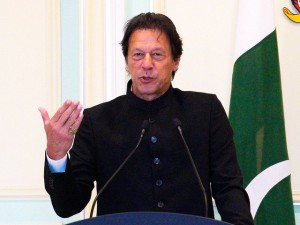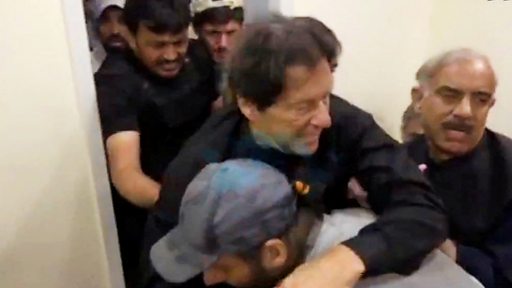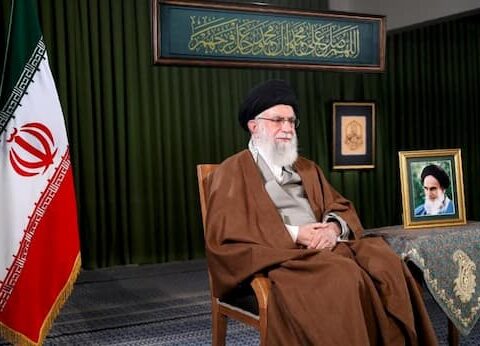The failed assassination attempt against ousted Pakistani Prime Minister Imran Khan recently was not a surprise.
When I covered the controversies around Khan’s removal from office back in April, I included a look back at Pakistan’s previously most popular former Prime Minister, Zulfikar Ali Bhutto: and, more specifically, how similar Khan’s and Bhutto’s situations were becoming, right down to both men alleging a foreign-backed plot against them.
I wrote then, ‘But compared to what befell Bhutto, Khan at least gets out with his dignity (and his life).’
And, remarkably, that’s still true: but, boy, was the story nearly different – all that was needed was for one of those bullets to have followed a slightly different trajectory.
I also wrote in the same article: ‘However, the danger isn’t over for him. If Imran Khan has powerful enemies opposed to his holding office, then he will need to be very careful…’
Not that the ousted PM is naive about any of this: Khan has openly said in interviews that the country’s powerful families and elites would try to have him bumped off.
Everything Khan has said and done since his highly questionable removal from office in April indicates that he is not going to back down or walk away from what he evidently views as a struggle between his hugely popular party (the Movement for Justice) and Pakistan’s establishment forces.
Clearly, the longer he persists – and the longer he continues to fire up his enormous numbers of supporters – the more danger he is going to be in from the same forces that were behind his removal from office in the first place.
The sole gunman who was arrested at the scene and cited as the would-be-assassin has finally been identified as Naveed Mohammad Basheer. The dishevelled-looking Basheer, it could easily be said, has the look of the patsy about him. In a police video, the suspect admits to being the assailant and wanting to kill Khan (for ‘spreading hatred’) and claims to have been acting entirely alone.

However, the claims of a second gunman persist, including that he was tackled by a Khan supporter: and there were also eyewitness claims of another shooter inside a building.
Bizarrely, although the aforementioned Basheer has been paraded before cameras as the sole assailant, the other gunman – who was allegedly seen by plenty of witnesses – has entirely evaded capture: and is in fact barely mentioned at all by the authorities or the main state media.
Questions also need to be asked about the reliability of Basheer’s filmed statements: one has to wonder whether the confession and statements on video were made under duress. The narrative, which seemed to have been spun in advance of the actual incident, is that the shooter was a religious fanatic outraged by some of Khan’s statements that were perceived to be anti-Islamic. However, Khan (a deeply religious person himself) claims that this narrative was fabricated by his political enemies and elements of the media simply in order to provide the gunman with a believable motive.
The named suspect is also claimed by Punjab police to be a drug addict.
Imran Khan, or at least people close to him, have in fact named specific individuals they believe to be have been behind the failed assassination attempt: these being Pakistan’s present Prime Minister Shehbaz Sharif (who was undemocratically put into office to replace Imran Khan after Khan’s ousting in April), Interior Minister Rana Sanaullah and a senior Pakistan Army official named Major General Faisal Naseer.
The fact that Khan would publicly name these people he thinks were behind the attempt is pretty extraordinary itself: but, as he explained in a recent interview with Piers Morgan, he felt that identifying the plotters in advance would make it harder for them to act against him.
This evidently didn’t prove to be the case: which is presumably why the ‘religious fanatic’ narrative was needed – to try to make the lone wolf scenario seem more credible.
It should be noted that enormous numbers of Pakistanis (especially the youth, who are Khan’s most loyal supporters) believe the former PM’s claims of an elite/establishment conspiracy, as well as the assertions – made prior to the no confidence vote in April – that the United States was trying to remove him from office and install a ‘foreign imported government’: they therefore see Khan’s removal as a foreign-influenced plot and a violation of Pakistani democracy and self-determination.

Whether this claim was true or not is difficult to know, of course.
Certainly the Pakistani elites and the political dynasties were involved in a conspiracy to remove him from office – presumably in order to protect their interests, particularly financially. But whether or not the US was involved in entirely unproven.
Khan’s claims about the US may have been an act of desperation to avoid the no confidence vote – which is what his critics say.
What’s curious, however, was his claim that he had access to a letter involving the US Ambassador and which proved that such a conspiracy existed. He was prevented from making that letter public by the Supreme Court: which is in itself curious. There are also claims that it was the Pakistani military who didn’t want the document made public.
If Khan was lying about the existence of such a document, it’s odd that the court would ban him from making the document public (since banning disclosure of a document means the document exists).
Attempting to stave off the no confidence vote, Khan had dissolved parliament and called for snap elections: on the grounds that parliament and the imminent vote were both compromised by foreign interference. But the Supreme Court had ruled this action unlawful and allowed the vote to go ahead.
Given the insane levels of popular support for the former sports star, it is highly likely that a snap election would’ve worked in his favor: and would’ve made it more difficult for the political opposition to remove him from office. That dynamic remains the defining one now too, with Khan and his supporters calling for elections and the ‘government’ knowing it will get trounced if said elections are allowed to go ahead.

Far better, it would seem, for Khan to be killed before any such elections become unavoidable.
Which means that, between now and whenever those elections are going to happen, Khan and those close to him are going to be in continual danger. It would not be surprising at all if further attempts on his life are made: or if one of them ends up succeeding.
No Pakistani Prime Minister in the country’s entire history has managed to serve out a full term in office: removal from office, arrest, assassination, even execution, are fates that have befallen previous PMs.
In terms of Zulfikar Ali Bhutto, as was noted in the article from April, he not only believed the US was involved in the conspiracy against him but even claimed – just like Khan has – to have seen a document proving it.
And, bearing in mind Khan’s huge support among the people and the likelihood of him winning any future election in a landslide, let’s note that Zulfikar’s massive popular support was the very thing that led to his arrest and eventual execution: the religious parties simply claimed that Zulfikar and the Pakistan People’s Party could not *possibly* have won by such big margins… and that the elections therefore must’ve been corrupt. That implication, along with subsequent (and unproven) accusations of unlawful acts on Bhutto’s part, were enough to lead to Bhutto being hanged.
God knows how this struggle between Imran Khan and the country’s elite/establishment is going to play out.
And there are also parallels to be drawn not just between Khan and Zulfikar Ali Bhutto, but between Khan and Bhutto’s daughter too. Benazir Bhutto‘s assassination in 2007 (which still hasn’t been satisfactorily resolved even now: and is still the subject of endless conspiracy speculation in Pakistan) came amid a similar wave of massive public support for her campaign and huge crowds following her around.
Khan’s support and popular momentum trumps even Bhutto’s. Benazir Bhutto, it should also be remembered, had already survived one assassination attempt during her campaign before the second attempt succeeded. Like Khan, despite one failed attempt on her life, she continued campaigning (at great risk to her life) – and paid the price.
_________________
Getting back to the issue of possible US involvement, Washington has of course denied any involvement in what happened in April.
But Imran Khan has been seen as one of the most openly anti-American leaders in Pakistan since the days of Zulfikar Ali Bhutto. He has also been a fierce opponent of everything Pakistan was involved in during the US-led War on Terror – as well as the enormous price the country has paid from that entire period. His statements at the time, about Pakistan being a “slave” of the US and the West, as well as his decision to go to Moscow and meet with Putin even as Western nations were sanctioning and boycotting Russia over the invasion of Ukraine, make it entirely plausible that the US would’ve considered Khan by now to be a problem.
That doesn’t necessarily mean Washington was behind the coup in April: but the US would certainly not have had any sadness about Khan being forced from office.
It is entirely possible that various figures in the judiciary and the political opposition might’ve been collaborating with both foreign interests and the ever-present Deep State or ISI to make sure this happened: but, with or without foreign interference, it is almost certain that the same figures – the ‘mafia’ that controls Pakistan’s fate, as Khan has called them – conspired to force an extremely popular leader from office so that the powerful families and influences could reassert control over their interests.
It was so clearly obvious back in April that this was what was happening: with Khan’s unelected replacement, Shehbaz Sharif, being installed into office despite being under criminal investigation himself for financial crimes. Sharif’s brother, a former disgraced Prime Minister himself (Nawaz Sharif), lives in-exile in the UK and is wanted in Pakistan even now to face criminal charges.
Imran Khan had been complaining for some time about the UK harbouring criminal members of Pakistan’s elites and allowing them to keep their dirty money there: money, he claimed, that had been stolen from the Pakistani people. He wanted all of this laundered money to come back to Pakistan: and he wanted these elite figures brought back to the country to face the courts.
So it’s hardly any surprise that those families and interests were going to act against him sooner or later.
Zulfikar Bhutto himself had said he was being targeted by what he’d called the two hegemonies over Pakistan’s fate – the internal one, being the military and the corrupt elites, and the external one being the United States.
As I wrote here in April, it seems wholly feasible to say – and in keeping with the historical context – that Imran Khan is at war with the same marriage of interests. In which case, this is the same struggle going on four decades later for control of Pakistan, only with a different cast of characters.
If either history or the continuing power dynamics within Pakistan are anything to go by, Imran Khan is never going to be entirely safe. And his hundreds of thousands or even millions of supporters aren’t going to be able to protect him forever.
The HAITI Assassination Plot: The Victim Nation & the Plaything of the Elites…




